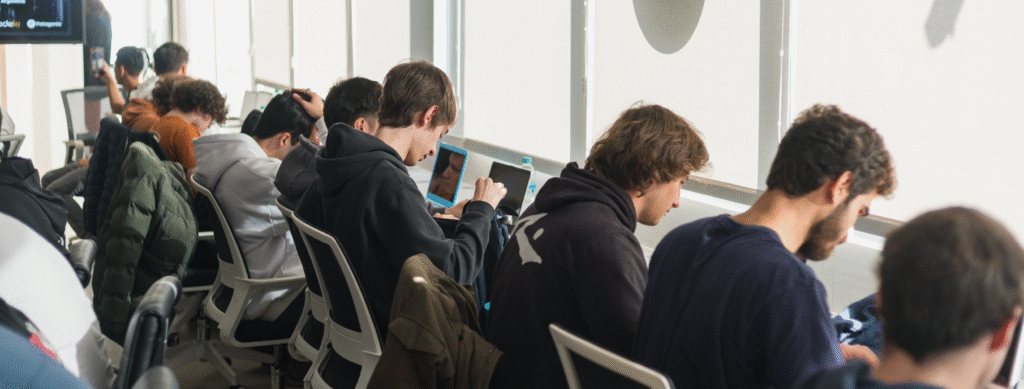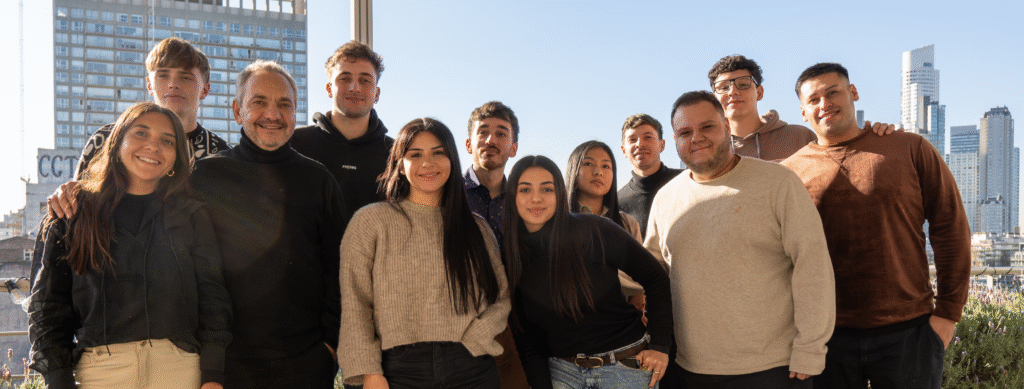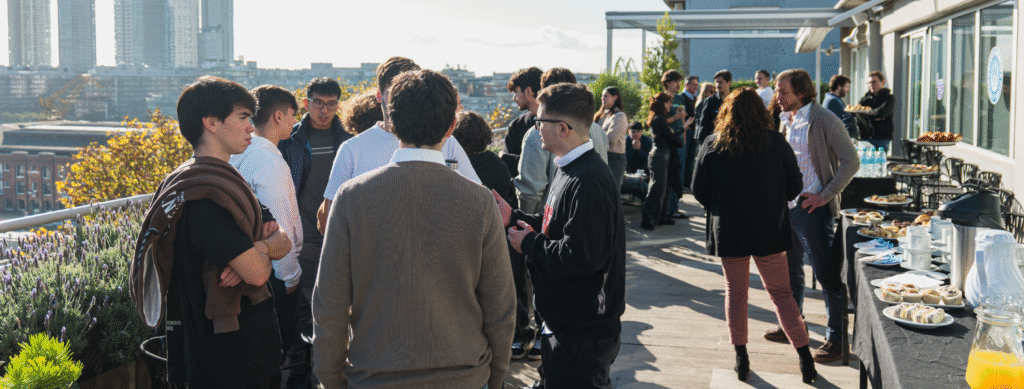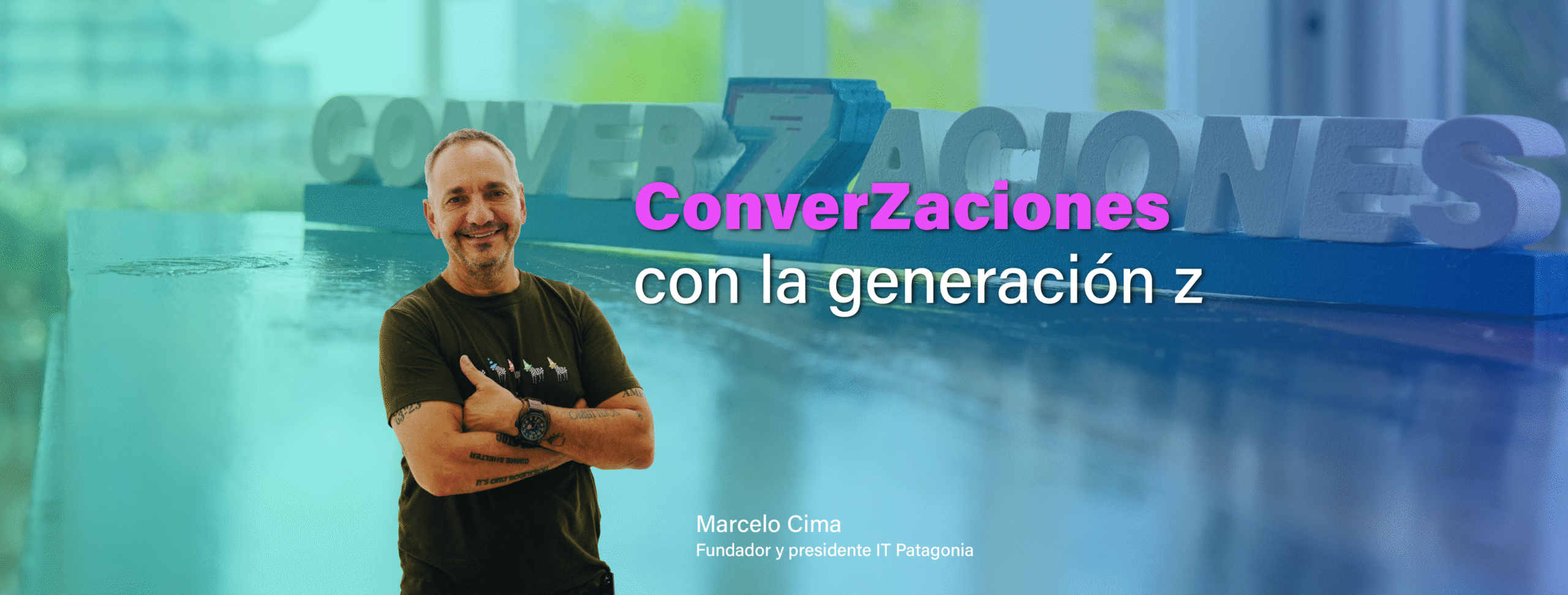Generation Z: The talent destined to transform work (and technology)
Digital transformation is not just a matter of systems, platforms, or data. It is also—and perhaps above all— a human transformation.
Every new technology introduced into the world of work coexists with generations that interpret, adopt, and shape it through their own unique means. In this context, Generation Z is a key player.
The current technological ecosystem, and especially that of organizations that integrate core systems with modern developments, is influenced by the new work paradigm proposed by people under 30.
In this article we share the view of Marcelo Cima, founder and president of IT Patagonia, about how this generation, born in a hyperconnected world and marked by immediacy and self-taught learning, is redefining work dynamics in technologyAnd what organizations should do to integrate it and maximize its full value.
Story of a methodical and professional transgressor
Marcelo began his journey in technology long before digital transformation was even talked about.
His first approach was out of curiosity, solving hardware problems and exploring systems on his own, at a time when the internet didn't offer immediate answers.
With no industry contacts or shortcuts available, every step was the result of effort: Studying while working, seeking opportunities in companies that value attitude over resumes, and learning from every mistake.
Over time, and driven by a fire of "healthy rebellion" that has been with him since he was a child, his perseverance led him to specialize in complex environments and critical technologies for large organizations.
Her story is one of resilience, which serves as a demonstration of how passion, authenticity and the ability to sustain decisions with work and commitment can shape a solid, humane, and purposeful business trajectory.
Today, more than 40 years later, he is the person leading the "passing of the torch" to new generations at IT Patagonia, actively participating in the development of new teams and fostering talent just starting out.
“Everything I know, I learned by doing. Without tiring, with perseverance, sacrifice, gratitude, and the ability to make informed choices.”
Marcelo Cima
Understanding generational change is also part of digital transformation.
Automation, the generative artificial intelligence, hybrid models and collaborative work environments They are part of a digital transformation that is advancing relentlessly.
But sometimes it is easy to forget that this transformation, in addition to technology, It is crossed by different people, cultures and generational views.
“Many times we believe that young people come without experience, but what they bring is another type of experience" says Marcelo. "They bring a different logic, other ways of looking at things and asking questions. And that's where their unique value lies," he adds.

Transforming work is also transform the way we relate to each otherAnd, on that path, listening, openness, and shared learning are our best tools.
For Marcelo, the key is to listen attentively, with genuine interest. "When you understand that it doesn't come to replace, but to complement, and that the knowledge it brings is enhanced when it connects with the experience of those who have already walked a path, something happens that is much greater than the sum of its parts," he summarizes.
At IT Patagonia we support large companies in their processes technological modernization and digital transformationOne of the biggest challenges we face when leading these projects is Captivate young people to become interested in developing professionally in technological environments.
For years, we've been committed to training younger generations in core technologies such as COBOL, Natural Adabas, and Mainframe, integrating them into agile teams where they work alongside senior professionals. Along the way, we've found that This generational crossover is not just a market need: it is an opportunity. special.
Who is Generation Z and what are they looking for in a job?
Generation Z is made up of people born between the mid-1990s and the early 2010s.
According to Great Place to Work, it represents more than 20% of the current workforce and will have an even greater weight in the coming years.
Some characteristics that distinguish Generation Z are the following.
- They value flexibility and autonomy: They seek work arrangements that allow them to balance their personal lives, explore their interests, and develop freely.
- They have a high expectation of purpose: they expect the companies they work for have a positive impact on society and the environment.
- They grew up with the internet and immediate access to information: They learn in a self-taught way, are inclined to pragmatism, are very curious, and question processes if they don't make sense to them.
- They require constant feedback: they coexist with digital environments where feedback is immediate and continuous.
- They value emotional well-being: Mental health and the work environment are central aspects when it comes to choosing where to work.
According to a Deloitte report on millennials and generation Z, Only 34% of Gen Z globally feel motivated by their current job..
From this data we can conclude that the disconnection of younger generations with organizations It is a concrete risk if they are not listened to, challenged and offered a constant learning environment..
Leading in Times of Change: What Generation Z Has to Teach Us
Guiding Generation Z with purpose is a complex challenge. And it's also a learning opportunity.
It's not enough to tell them what to do, We must jointly build the why, the how and the why.
“This paradigm shift forces you to think differently too,” Marcelo emphasizes. “One of the main lessons I learned is that the way we teach has changed. It's no longer enough to transmit technical knowledge; you have to contextualize, connect with the project's purpose, adapt the learning pace, and make room for young people to teach as well,” he adds.
That's why, the key is to generate trust.
“Only 6% of Generation Zers aim to achieve a leadership position.”
2025 Gen Z and Millennial Survey, Deloitte.
Also in, not only having, but demonstrate openness to the new ideas and perspectives that Generation Z bringsBecause experience can be daunting, and as a result, one can very easily fall into a position of superiority.
And respect is no longer earned through position. It's earned by being present, actively listening, recognizing when there's something you don't know for sure, and celebrating what others contribute. The role of the leader changes: he is no longer the one who gives the line, he is the one who enables.

Generation Z's contribution to technological projects
What does this new generation add to technology teams? Marcelo summarizes it in three major contributions:
- Fresh mindset: It is not conditioned by “what has always been done this way”, which allows you to think of solutions from scratch.
- Orientation to users: She grew up using digital products with a focus on experience, which makes her very attentive to how the person using what she develops will feel.
- Ability to learn quickly: They have a habit of searching for tutorials, forums, and online documentation. They don't wait for someone to give them everything solved.
In a recent project linked to the modernization of banking processesMarcelo noticed how a work cell composed of senior profiles and newly hired young people managed to solve a problem that had been stalled in weeks.
The key was that the younger ones questioned something we already took for granted. And the older ones were open to listening to them. This generated a super-powerful dynamic, which amplified the results.
Challenges and opportunities of working with Generation Z
In this day-to-day life that we have been narrating, not everything is fluid.
There are real challenges, because it's not always easy to build discipline in the necessary timeframe. Sometimes there's anxiety, or an expectation of quick results, but if these feelings are addressed well, they become a very powerful driving force. Because that urgency is also energy.
In this sense, Marcelo always says that One of the most important points for leadership is to be prepared to accompany"You can't expect someone new to a highly complex project to adapt on their own. You need to be close, create structure, without stifling creativity. It's a fine balance," he emphasizes.
That is why, at IT Patagonia we have consolidated a working model which prioritizes support throughout the process and combines technical mentoring, process monitoring, and spaces for cultural integration.
With this methodology, we ensure that each new person who joins our teams or those of our clients understands the context of their position and the industry, the architecture of the systems and, above all, the impact your work has in users.
What companies can - and should - do
As we've been saying, integrating Generation Z into teams isn't an option, it's a necessity.
But it is not enough to hire young people: We must design environments in which they can develop, contribute value and remain.
Today, Generation Z is at a key stage of transition between academic training and working life. And they have clear expectations about how they want to build their professional career.
She especially values jobs that allow her to maintain a balance between her professional and personal life, and prioritizes proposals that offer flexibility, learning opportunities, and a clear purpose.
They don't seek linear paths: they aspire to roles that allow them to learn continuously, move with agility and feel like an active part of a culture that listens to them and challenges them.

Some key points that specialists highlight and that we apply in our practice are:
- Offer real challenges: This generation wants to learn by doing, not be underutilized.
- Provide feedback and support: Recognition matters as much as autonomy.
- Creating diverse and inclusive environments: authenticity is a core value.
- Enabling young people's voices in decision-making: Your contributions can make a difference if you take them seriously.
- Sustain a culture that prioritizes learning: Continuing education is not a benefit, it is a condition of belonging.
In our experience, we've confirmed that organizations that manage to generate a sense of belonging among Generation Z not only retain talent, but also build more innovative, collaborative, and resilient teams.
Conclusion
Generation Z is not the future of work: is the present.
At IT Patagonia, we understand that generational change is not an obstacle, but rather a lever for growth.
Want to learn more about how we integrate young talent into high-impact projects? Contact us and find out. how we empower digital transformation with diverse, committed teams prepared for the challenges of today and tomorrow.

